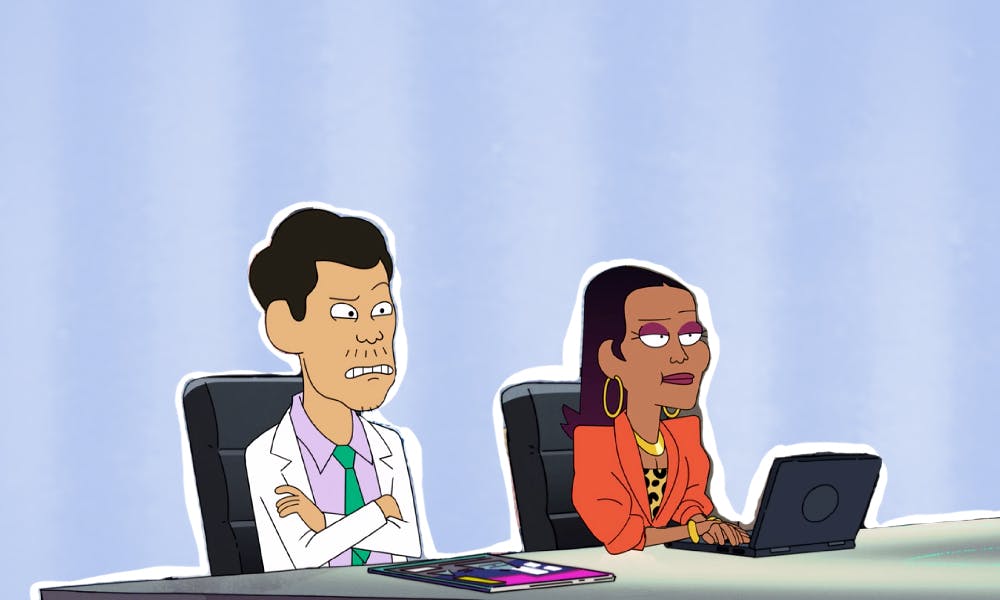“The world is controlled by shadowy elites and shape–shifting lizard people.” That’s the premise of Netflix’s new animated comedy series, Inside Job. Released on Oct. 22, 2021, it's already made the top 10 list on U.S. Netflix. Part 1 consists of ten impeccable, 30–minute episodes and Part 2 is expected to air sometime in 2022. The show is centered on a group of misfits who work at Cognito Inc., a clandestine agency whose function is to keep the truth hidden from the rest of the world. Both an exploration of workplace dynamics and a mockery of conspiracy theories that have proliferated in modern society in light of scientific and technological developments, Inside Job is the definition of satirical success.
Any conspiracy theory that one can think of—5G technology being carcinogenic, the flat–Earth theory, moon–landings being faked, the existence of the deep state—is canonical in the fictional world created by Alex Hirsch—who also produced Gravity Falls—and Shion Takeuchi. Public video surveillance is portrayed not as a safety measure, but as a means of control. One wrong move, and an extraction team will show up at your doorstep with a body bag. In the world of Inside Job, FBI agents are most definitely watching you through your laptop camera.
What’s so compelling about the series is that it not only wholeheartedly embraces the absurd, it takes these conspiracies and distorts them. Oh, global warming is real all right. In fact, reptoids, many of whom are celebrities and A–listers, collaborate with Cognito Inc. to prevent action from being taken to combat environmental threats so that their optimum body temperature can be maintained.
It also makes the metaphorical literal. The derogatory term “sheeple” is turned on its head when the camera pans to the human–sheep hybrids that walk around in the lab where “fingerprint erasers” and mind–controlling candy are invented and produced in bulk.
Above all, it makes its eccentric characters relatable when it inserts real–life workplace stereotypes into this fictional world to pander to their adult audience. You have the patriotic, militaristic Glenn Dolphman; mind–reading, alien mushroom Magic Myc; drug addict Andre; finger–guns–galore Brett Hand; and power–hungry, tech–savvy scientist Reagan Ridley. Reagan struggles to assert her authority to her team, whose habits of getting high and ignoring her instructions paint them as less than ideal employees. However, her lack of people skills and insensitivity to social cues makes it incredibly difficult to work with her and damages workplace morale.
Outside the professional sphere, Inside Job explores adult problems through a comedic lens, its lighthearted nature rendering issues such as social anxiety disorder, childhood trauma, and parent–child relationships more palatable. The fact that Reagan goes as far as creating a robot version of a guy she’s too scared to ask out and be emotionally vulnerable with is a strangely accurate, albeit exaggerated, depiction of typical concerns surrounding relationships.
The strong characterizations in this show deserve some recognition as well: Reagan, the protagonist, is a complex character with a questionable sense of morality and unlimited ambition. In many ways, she is an antiheroine. She is motivated by self–interest (“Imagine it, me, ruling the office with an iron fist,” she exclaims, as she envisions her coveted promotion), excluded in the workplace by her co–workers, and self–destructive (her wacky inventions often end up harming her both personally and professionally).
Her appointed co–leader and fitness junkie Brett Hand is your archetypal heterosexual white male. What he lacks in skills and experience, he makes up for in connections from his frat days at Yale, firm handshakes, and obsequiousness. In his character we witness the phenomenon of “pretty privilege,” or “lookism" at play: His “generic good looks” grant him immediate popularity within the company. However, his emotional honesty and self–awareness make him infinitely more likeable. As much as we might try to deny it, even he is a relatable character at certain points in the show.
As we reside in the penultimate month of the year, it can be encouraging to some and demoralizing to others that we’ve passed the midpoint mark of the semester. Regardless of your predictions for the chances of you surviving the semester, this animated series is guaranteed to put a smile on your face. Not only does it validate our feelings—like Brett, we all crave that external validation from time to time—but its unexpected twists and hot takes on conspiracy theories are a refreshing distraction from the chaos of college life.







